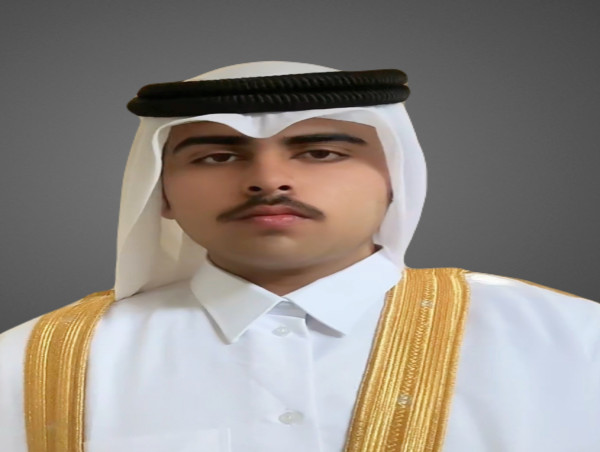DOHA , QATAR, June 25, 2025 /EINPresswire.com/ -- In a move reflecting both diplomatic foresight and a commitment to intergenerational governance, the State of Qatar has appointed a youth delegate to its United Nations mission. This action represents a growing institutional belief that solutions to global challenges must include input from emerging leaders.
Shiekh Mohammed Abdullah K H Al Thani now represents Qatar’s Ministry of Foreign Affairs as a youth participant in United Nations activities, with responsibilities spanning regional policy, multilateral diplomacy, and ethical innovation. His participation contributes to the country’s evolving foreign policy, which emphasizes a balance between tradition and modernity.
A Structural Shift in Representation
While the presence of youth in global affairs has often been limited to advocacy roles or educational programming, Qatar’s approach involves embedding younger delegates within formal diplomatic channels. This model is designed to ensure not only visibility but also influence. Through such appointments, youth are positioned to contribute directly to multilateral dialogues on peacebuilding, technological governance, and cross-border cooperation.
This initiative is part of a larger diplomatic transformation in the Gulf, one in which emerging voices are beginning to influence high-level policy decisions. International organizations, including the United Nations and World Bank, have urged member states to incorporate younger perspectives, especially in arenas such as peace negotiations, innovation regulation, and social equity.
The decision to elevate a student representative reflects Qatar’s alignment with these international priorities and highlights the state’s focus on innovation in governance.
Youth Participation and UN Frameworks
Globally, the United Nations has formalized mechanisms for youth inclusion, including the Youth2030 Strategy and the establishment of the UN Youth Office. Security Council Resolution 2250 also calls on member states to recognize the role of youth in maintaining and promoting international peace and security. In this context, Qatar’s engagement is not only nationally relevant but also internationally resonant.
The representative is tasked with contributing to discussions on:
-Humanitarian collaboration in conflict-affected zones
-Regional security policy frameworks
-Ethics in AI and emerging technologies
-Intergenerational decision-making and diplomacy
His involvement helps amplify Qatar’s contributions to these forums, particularly in areas of diplomacy where long-term vision and innovation are central to success.
A spokesperson from the Ministry of Foreign Affairs stated:
“Qatar sees inclusive diplomacy not as a trend but a necessity. Youth participation adds depth, agility, and long-term perspective to policy debates.”
Diplomatic Agility Through Generational Inclusion
Involving younger professionals in diplomacy allows states to adapt to fast-changing global dynamics. From AI to climate resilience, today’s challenges often require a blend of technical fluency and cultural understanding. Younger delegates bring both, especially when trained in statecraft and aligned with national priorities.
Qatar’s youth diplomacy model is particularly relevant in the Middle East, where the median age of the population is below 30. Leveraging this demographic for foreign policy innovation may offer long-term strategic advantages. The involvement of youth in diplomacy also encourages civic engagement and strengthens public trust in institutions by signaling openness and modernity.
The student representative’s appointment is, therefore, more than a symbolic gesture; it is a calculated strategy to build diplomatic capacity for the coming decades.
Diplomacy in a Multipolar World
The global diplomatic landscape is currently experiencing a shift toward multipolarity. As new power centers emerge and alliances are reevaluated, the importance of adaptive, inclusive diplomacy grows. Qatar’s foreign policy already emphasizes multilateralism, neutrality, and engagement with diverse stakeholders.
Adding youth voices to this framework allows for greater responsiveness to emergent issues like cyber diplomacy, disinformation regulation, and ethical innovation. These are fields where generational insight often complements institutional experience.
By formally involving younger professionals in such domains, Qatar’s Ministry of Foreign Affairs signals its readiness to confront future-oriented challenges with a diversity of perspectives.
Regional Implications
While other Gulf states are experimenting with modernization across various sectors, Qatar’s investment in youth diplomacy is one of the clearest examples of institutional innovation in the region’s foreign affairs apparatus. It reflects a growing acknowledgment that younger professionals, when supported by state infrastructure, can contribute meaningfully to international governance.
This move may also have implications for Qatar’s regional leadership positioning. As countries in the Gulf increasingly participate in global dialogues on sustainability, AI governance, and conflict resolution, those integrating cross-generational models may be better positioned to lead complex negotiations and multilateral collaborations.
Focus on Institutional Legitimacy and Continuity
Institutional legitimacy in foreign affairs relies in part on adaptability. Engaging the next generation of diplomats helps build continuity, ensuring that institutional knowledge is passed down and reshaped in response to emerging global realities.
By giving Shiekh Mohammed real diplomatic responsibilities, the Ministry of Foreign Affairs is demonstrating how future leaders can be cultivated through practice, not just preparation. This also contributes to Qatar’s image as a state willing to innovate within its governance structures.
His current responsibilities include contributing to:
-Regional forums on peace and security
-UN sessions addressing digital development and youth inclusion
-Informal consultations on humanitarian frameworks
-Multistakeholder dialogues on cultural diplomacy
These engagements are consistent with Qatar’s broader diplomatic commitments and reflect a trusted delegation of responsibility from senior officials to younger appointees.
Youth in Policy Innovation and Ethics
One key area where youth participation is particularly impactful is innovation ethics. With artificial intelligence, biotech, and digital platforms rapidly altering social and political landscapes, policy frameworks must keep pace. Qatar’s integration of youth into diplomatic roles may accelerate the creation of ethical, forward-looking policies that account for technological change.
Shiekh Mohammed’s involvement in AI ethics discussions positions Qatar as a state prepared to contribute meaningfully to global debates on governance of emerging technologies. It also reinforces the idea that diplomacy today requires fluency in both political dynamics and technical discourse.
Global Reception and Outlook
International observers have praised the move as consistent with United Nations calls for broader youth inclusion. Policy analysts suggest that youth participation in formal diplomacy improves the diversity of policy options and enhances long-term outcomes by challenging institutional blind spots.
At the same time, this approach must be evaluated over time. Success will be measured not only by visibility or media coverage but by the effectiveness of policy proposals and their integration into multilateral agreements.
Early signs indicate that Qatar’s efforts are being received positively in diplomatic and academic circles. If maintained, this model could serve as a blueprint for other countries in the MENA region seeking to modernize foreign policy processes.
Conclusion
Qatar’s decision to empower youth through formal diplomatic appointments underscores its commitment to institutional adaptability, inclusive governance, and global collaboration. As the international system continues to evolve, generational inclusivity is increasingly being recognized as a pillar of durable and effective diplomacy.
Through the appointment of Shiekh Mohammed Abdullah K H Al Thani, Qatar not only signals a break from convention but also contributes to a broader conversation about how diplomacy can remain relevant in the face of rapid global change.
With a focus on innovation, human development, and responsible statecraft, Qatar’s model of youth diplomacy offers a new template for engagement, one that prioritizes collaboration, long-term thinking, and multi-generational expertise.
Shiekh Mohammed Abdullah K H Al Thani
Ministry of Foreign Affairs- State of Qatar
974-5525-1432
email us here
Visit us on social media:
Instagram
Legal Disclaimer:
EIN Presswire provides this news content "as is" without warranty of any kind. We do not accept any responsibility or liability for the accuracy, content, images, videos, licenses, completeness, legality, or reliability of the information contained in this article. If you have any complaints or copyright issues related to this article, kindly contact the author above.
![]()






